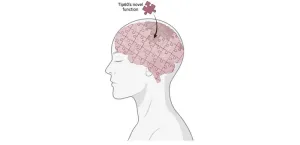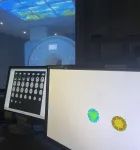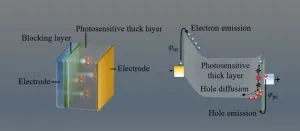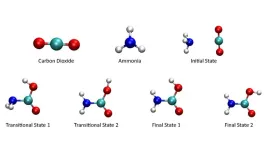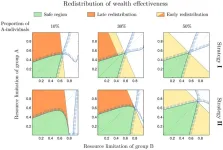(Press-News.org) Researchers from Drexel University have uncovered a novel regulatory mechanism in the brain that is essential for making the right kinds of proteins that promote healthy brain function, and its malfunctioning may be an early contributor of the development of Alzheimer’s disease.
Brain cells are continuously undergoing changes in response to environmental stimuli and to record new memories. Such complex brain capability relies on the ability of brain cells to generate different functional variants of the same protein using a process known as alternative RNA splicing.
Recent studies have reported defects in RNA splicing of genes in the brains of Alzheimer’s patients, which has led to the conclusion that splicing disruptions are considered an indicator of Alzheimer's disease. Causes for these splicing disruptions in the brain are still unknown, which has hindered the development of treatments focused on this defect.
The team led by Akanksha Bhatnagar, a PhD student, and Felice Elefant, PhD, a professor, who are biology researchers in Drexel’s College of Arts and Sciences, is the first to uncover the role of the Tip60 enzyme in binding to certain RNA in the brain to control how they are spliced.
This function is particularly important, the researchers suggest, because such RNA splicing ultimately generates the protein diversity required for learning and memory and the majority of RNA that Tip60 binds to are encoded by genes implicated in Alzheimer’s disease progression.
A 2018 Drexel study by Elefant’s lab showed that restoration of the enzyme Tip60 created a balancing of the enzymes in the brain and reversed symptoms in an Alzheimer’s model system. Building on that study, Elefant, Bhatnagar, and their team — whose findings were published in the Journal of Neuroscience — discovered that Tip60 doesn’t just regulate gene activation to make RNA, it also regulates the way RNA is spliced to generate diverse protein variants, which has been shown to contribute to the reversal of Alzheimer’s symptoms.
“We have previously shown that Tip60 enzyme levels are depleted in Alzheimer’s disease brains and this depletion results in some genes getting inactivated. However, with this new RNA splicing function, we now show Tip60 is also not present to bind to the RNA to allow for appropriate splicing in the brain and may be causing some of the splicing defects observed in Alzheimer’s disease,” said Elefant.
The researchers found that restoring depleted amounts of Tip60 in Alzheimer’s models, not only rescues gene activation, but also partially protects against splicing disruptions — demonstrating that the Tip60 enzyme can be a drug target to protect against two different processes that go awry in Alzheimer’s.
“RNA is essential in coding, decoding, regulation and the expression of genes,” said Akanksha Bhatnagar. “In the Alzheimer’s brain, not only is production of RNA being turned off, but also the way the RNA is being assembled to generate proteins is not correct. This is a critical piece in the Alzheimer’s disease puzzle that has opened new doors for understanding disease causes.”
The Elefant Lab at Drexel also explores how environmental changes can impact Alzheimer’s disease.
“More than 95% of Alzheimer’s cases do not have a clear genetic link with parents, they are arising sporadically due to external factors, or epigenetics,” said Bhatnagar. “We want to know how and why environmental changes can impact Alzheimer’s and one of the ways this can happen is through the enzyme we study, Tip60.”
These findings could lead to important developments for drug design and the treatment of Alzheimer’s, according to the team.
“If we can figure out what genes are being altered before deficits occur, there is a possibility that these RNA variations could serve as biomarkers to identify Alzheimer’s disease early on,” said Bhatnagar.
In addition to Bhatnagar and Elefant, Keegan Krick, Bhanu Chandra Karisetty, Ellen Armour and Elizabeth Heller contributed to this research. The research was supported by the National Institutes of Neurological Disorders and Stroke of the NIH.
Read the full paper here: https://www.jneurosci.org/content/jneuro/early/2023/02/24/JNEUROSCI.2331-22.2023.full.pdf
END
Solving the Alzheimer’s disease puzzle: One piece at a time
Drexel researchers shed light on role of Tip60 enzyme in genetic disruptions that cause Alzheimer’s disease
2023-03-14
ELSE PRESS RELEASES FROM THIS DATE:
Stephen Fantone elected chair of Hertz Foundation’s board of directors
2023-03-14
The Fannie and John Hertz Foundation, a nonprofit organization dedicated to empowering the most promising innovators in science and technology, has announced the election of Stephen D. Fantone as chair of its board of directors.
Fantone is the founder and president of Optikos Corporation, which provides innovative applications of optical technology, both products and services, to commercial, government and consumer products organizations worldwide. Fantone is a recognized expert in optical engineering and optical product ...
WVU lab’s game-changing high-performance semiconductor material could help slash heat emissions
2023-03-14
Researchers at West Virginia University have engineered a material with the potential to dramatically cut the amount of heat power plants release into the atmosphere.
A team led by Xueyan Song, professor and George B. Berry Chair of Engineering at the Benjamin M. Statler College of Engineering and Mineral Resources, has created an oxide ceramic material that solves a longstanding efficiency problem plaguing thermoelectric generators. Those devices can generate electricity from heat, including power plant heat emissions, which contribute to global warming.
The breakthrough ...
William Evans joins Hertz Foundation board of directors
2023-03-14
The Fannie and John Hertz Foundation, a nonprofit organization dedicated to empowering the most promising innovators in science and technology, has announced the election of William Evans to its board of directors.
Evans is the physics division leader in the Physical and Life Sciences Directorate at Lawrence Livermore National Laboratory (LLNL), which works to enable United States security and global stability and resilience by empowering multidisciplinary teams to pursue bold and innovative science and technology.
“It is imperative that the Hertz Foundation’s board of directors ...
COVID-19 pandemic has long-lasting effects on adolescent mental health and substance use
2023-03-14
March 14, 2023-- The COVID-19 pandemic has had a long-lasting impact on adolescent mental health and substance use according to a new population-based study are based on survey responses from a nationwide sample of over 64,000 13–18-year-old North American and Icelandic adolescents assessed prior to and up to two years into the pandemic. The study was conducted by faculty at Columbia University Teachers College and Mailman School of Public Health and a team of Icelandic and other North American clinical, behavioral and social scientists. The findings are published in published in The Lancet Child & Adolescent Health.
This same research team ...
Learning behavior differs between OCD and problem gambling
2023-03-14
Shinsuke Suzuki at The University of Melbourne, Australia reports distinct patterns of reward-seeking behavior between obsessive compulsive disorder (OCD) and problem gambling, in a study publishing in the open access journal PLOS Biology on March 14th. OCD is associated with lower-than-normal learning rates when rewards are less than expected. On the other hand, people with problem gambling exhibit boosted and blunted learning from rewards higher and lower than expected, respectively.
Understanding the differences between obsessive and addictive behaviors is essential for developing treatments for conditions like problem gambling ...
Global maternal Strep B vaccination program could save millions and prevent thousands of deaths worldwide
2023-03-14
A global maternal immunization program for group B Streptococcus - strep B - would save millions in healthcare costs by reducing death and disability, but without tiered pricing, equitable access would likely not be achieved. Several vaccines are currently under development, and an assessment of the impact and value of a global program is publishing March 14th in the open access journal PLOS Medicine. It finds that this could avert over 200,000 cases and more than 31,000 deaths, and reduce disability in children.
Strep B can infect pregnant women and their babies, causing sepsis and meningitis in newborns, and sometimes leading to death or disability. ...
Dark current modeling of thick perovskite X-ray detectors
2023-03-14
X-ray detection is widely used in medical imaging, radioactivity detection, security checking, industrial flaw inspection, and so on. In recent years, metal halide perovskites have demonstrated excellent performances in the detection of X-rays and gamma-rays. However, most studies focus on perovskite single-pixel devices. To achieve the application goal of X-ray imagers, the detectors should be integrated with pixel circuits. This means that the device dark current is an important figure of merit to be considered. The low dark current can guarantee ...
Cleaning up the atmosphere with quantum computing
2023-03-14
WASHINGTON, March 14, 2023 – The amount of carbon dioxide in the atmosphere increases daily with no sign of stopping or slowing. Too much of civilization depends on the burning of fossil fuels, and even if we can develop a replacement energy source, much of the damage has already been done. Without removal, the carbon dioxide already in the atmosphere will continue to wreak havoc for centuries.
Atmospheric carbon capture is a potential remedy to this problem. It would pull carbon dioxide out of the air and store it permanently to reverse the effects of climate change. Practical carbon capture technologies are still in the early stages of development, with the most promising involving ...
Fighting intolerance with physics
2023-03-14
WASHINGTON, March 14, 2023 – In a world experiencing growing inequality and intolerance, tools borrowed from science and mathematics could be the key to understanding and preventing prejudice.
In Chaos, by AIP Publishing, Luis A. Martinez-Vaquero of the Polytechnic University of Madrid applied evolutionary game theory, which combines techniques from economics and biology, and complex system analysis to investigate the relationship between inequality and intolerance. He found that inequality boosts intolerance and that redistribution ...
Association between California’s state insurance gender nondiscrimination act and utilization of gender-affirming surgery
2023-03-14
About The Study: Implementation in California of its Insurance Gender Nondiscrimination Act was associated with a significant increase in utilization of gender-affirming surgery in California compared with the control states Washington and Arizona. These data might inform state legislative efforts to craft policies preventing discrimination in health coverage for state residents, including transgender and gender-diverse patients.
Authors: Anna Schoenbrunner, M.D., of Ohio State University in Columbus, is ...
LAST 30 PRESS RELEASES:
Public and patient involvement in research is a balancing act of power
Scientists discover “bacterial constipation,” a new disease caused by gut-drying bacteria
DGIST identifies “magic blueprint” for converting carbon dioxide into resources through atom-level catalyst design
COVID-19 vaccination during pregnancy may help prevent preeclampsia
Menopausal hormone therapy not linked to increased risk of death
Chronic shortage of family doctors in England, reveals BMJ analysis
Booster jabs reduce the risks of COVID-19 deaths, study finds
Screening increases survival rate for stage IV breast cancer by 60%
ACC announces inaugural fellow for the Thad and Gerry Waites Rural Cardiovascular Research Fellowship
University of Oklahoma researchers develop durable hybrid materials for faster radiation detection
Medicaid disenrollment spikes at age 19, study finds
Turning agricultural waste into advanced materials: Review highlights how torrefaction could power a sustainable carbon future
New study warns emerging pollutants in livestock and aquaculture waste may threaten ecosystems and public health
Integrated rice–aquatic farming systems may hold the key to smarter nitrogen use and lower agricultural emissions
Hope for global banana farming in genetic discovery
Mirror image pheromones help beetles swipe right
Prenatal lead exposure related to worse cognitive function in adults
Research alert: Understanding substance use across the full spectrum of sexual identity
Pekingese, Shih Tzu and Staffordshire Bull Terrier among twelve dog breeds at risk of serious breathing condition
Selected dog breeds with most breathing trouble identified in new study
Interplay of class and gender may influence social judgments differently between cultures
Pollen counts can be predicted by machine learning models using meteorological data with more than 80% accuracy even a week ahead, for both grass and birch tree pollen, which could be key in effective
Rewriting our understanding of early hominin dispersal to Eurasia
Rising simultaneous wildfire risk compromises international firefighting efforts
Honey bee "dance floors" can be accurately located with a new method, mapping where in the hive forager bees perform waggle dances to signal the location of pollen and nectar for their nestmates
Exercise and nutritional drinks can reduce the need for care in dementia
Michelson Medical Research Foundation awards $750,000 to rising immunology leaders
SfN announces Early Career Policy Ambassadors Class of 2026
Spiritual practices strongly associated with reduced risk for hazardous alcohol and drug use
Novel vaccine protects against C. diff disease and recurrence
[Press-News.org] Solving the Alzheimer’s disease puzzle: One piece at a timeDrexel researchers shed light on role of Tip60 enzyme in genetic disruptions that cause Alzheimer’s disease
